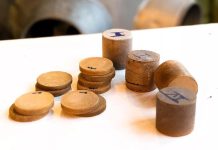DAVID A. YATES
Africa-Press – Liberia. Johan Forsell, the Swedish Minister for Development Cooperation and Foreign Trade believes that foreign aid can be useful as a tool in fighting poverty.
“We are now working with the government to try and find new kinds of synergy between both the cooperation portfolio and the foreign trade portfolio; we believe that foreign aid can be useful as a tool in fighting poverty,” he said.
“You also need, or do need, and as a strong believer in foreign trade, you will need private companies just like you need the rule of law and the market economy, where people can really interact with each other by doing businesses.”
He made the disclosure on Thursday, when he visited the Serving Humanity for Empowerment and Development (SHED) Farm in Mount Barclay, Montserrado County, which is funded by Mercy Corps Liberia.
However, after the tour, Forsell and the delegates were impressed by the innovative and sustainable farming practices being implemented at the SHED Farm.
He also learned about Mercy Corps’ focus on empowering local communities through agriculture and saw firsthand how this approach is improving food security and livelihoods in the area.
Forsell, who is currently in the country visiting several Swedish projects in partnership with the Liberian government, expressed his appreciation for Mercy Corps’ work in these sectors and emphasized the importance of continued collaboration between Sweden and organizations like Mercy Corps to achieve shared goals.
The visit was specifically organized by the Swedish Ambassador to Liberia, Urban Sjostrom, in partnership with Mercy Corps to assess the ongoing support for SHED Farm under the Promoting Sustainable Partnership for Economic Transformation (PROSPECTS) IV program.
The program is built on previous Government of Sweden investments through PROSPECTS I and II but moves to facilitate systematic change through the application of a market system development-based approach to creating decent and productive employment.
It is expected to last for 45 months, and aims to impact poverty by increasing incomes, job quality, and job security for youth.
At the sametime, the visiting Swedish Minister had the opportunity to hold an interactive discussion with the Executive Director of SHED Farm about the current situation of poultry farming and challenges in the country.
In her opening statement, Mercy Corps Country Director, Rabi Sani told the delegate that they are immensely grateful to the government of Sweden for its steadfast partnership with Mercy Corps, which has spanned over a decade and positively impacted the lives of thousands of Liberians.
She said, “It is through this enduring partnership that we have been able to launch a transformative initiative known as Promoting Sustainable Partnership for Economic Transformation (PROSPECTS IV).
According to her, this program is built upon incentivizing active private sector participation to drive local solutions, and stands as a game changer in the realm of sustainable development. Not only is it cost-effective, but it also holds immense promise for scalability.
“We are determined to revolutionize commercial maize production through a systematic value-chain approach. Our ultimate objective is to establish a sustainable model for poultry farming in Liberia that will yield far-reaching benefits for the country and beyond. We extend our deepest gratitude to the Sweden delegation, the Government of Liberia, and our partners for gracing us with their presence today. Your visit signifies the importance placed on this endeavor, and we are honored to have you join us,” Sani said.
Sani indicated that the underlying aim of their partnership with SHED is to address the significant financial drain caused by the import of feed and poultry products in the country by enhancing local capacity.
For her part, Joyce Queeglay Pajibo, Executive Director of SHED Farm, disclosed that as poultry farmers, they have about 40 percent of the market, and the remaining 60 percent are imported ones.
Pajibo, however, said that before the start of her project about 90 percent of the eggs consumed in Liberia were imported into this country.
She used the opportunity to thank the Swedish Ambassador to Liberia for making this work and also to Mercy Corps, urging them to work together and collaborate for the good of making Liberia a better place.
She further revealed that besides having this locally produced farmer, the Liberian populace could not eat safe eggs in the country at the time because “we all know that the shelf life is six to eight weeks. Before you bring the egg harvested from India and other places to Dakar and onward to Liberia, it has already lived its life, so that is the kind of product we were consuming before this project.”
“So, under this business we are working with the women through their corn farmer and the Swedish government through SIDA is supporting market system development, not like an NGO grant but this new phenomenon is like providing the linkages in the business that are missing or making the business climate difficult,” she concluded.
Source: Liberian Observer
For More News And Analysis About Liberia Follow Africa-Press






